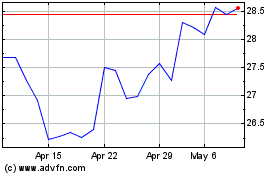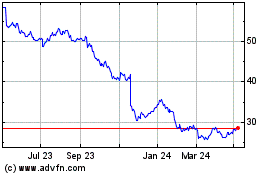Bayer to Rethink Roundup Formula for U.S. Consumers
27 May 2021 - 11:31AM
Dow Jones News
By Sara Randazzo and Ruth Bender
Bayer AG said it will evaluate whether to continue using the
active ingredient in its popular Roundup weedkiller in the
residential U.S. market, in the wake of a court setback Wednesday
in the company's efforts to limit future liability over whether the
product causes cancer.
Bayer has said it would pay up to $9.6 billion to settle
existing Roundup cases that tie the glyphosate-based product to
non-Hodgkin lymphoma and another $2 billion toward future claims.
The German company lost three trials between 2018 and 2019 brought
by Roundup users who said the product caused their cancer and is
working to resolve around 125,000 similar claims.
The company's attempt to resolve the future cases came in the
form of a novel class-action settlement, which sought to bind
people who have used Roundup but aren't yet sick, as well as
Roundup users with cancer who haven't already sued.
In a six-page Wednesday order, U.S. District Judge Vince
Chhabria in San Francisco concluded that the proposal would benefit
the company much more than Roundup users who blame the product for
causing cancer. He pointed to what he called "glaring flaws,"
including that it offered few benefits for those who haven't yet
gotten sick while forcing them to give up substantial legal rights
down the line.
Hours after the order, Bayer said it would abandon its efforts
at a court-approved solution to address its future Roundup
liability, which it said would have been the fairest,
most-efficient approach.
Instead, the company said it will pursue several avenues,
including creating a new website with studies relevant to Roundup's
safety that could also be reflected on its label. Bayer, which
stands by the safety of Roundup and its main ingredient,
glyphosate, said the website wouldn't draw any safety conclusions
but would help users make their own decisions.
The company also said it would rethink selling glyphosate-based
products to the U.S. residential market but not to professional or
agricultural users. The bulk of the lawsuits, it said, have come
from U.S. residential consumers.
The company could continue selling products under the Roundup
brand but without glyphosate.
Elizabeth Cabraser, a plaintiffs' lawyer who helped create the
proposal, said she was disappointed by the ruling and still
believes such a settlement would "provide tremendous financial,
health and safety benefits for class members."
Investors have been keenly awaiting Judge Chhabria's decision,
hoping an approval of the proposal would help break a yearslong
downward spiral of the company's share price, analysts say.
The challenge for Bayer is how to contain liability on a product
that it continues to sell without any warning label. The U.S.
Environmental Protection Agency has said the product is safe and
wouldn't permit a cancer warning.
At a daylong hearing earlier this month, attorneys pushing the
proposal argued that it was intended to benefit migrant farmers and
agricultural workers who use Roundup often but haven't been a huge
part of the plaintiff pool in the existing Roundup cases. During
the hearing, Judge Chhabria called that reasoning a "straw man"
that didn't make up for its failings.
Bayer and plaintiffs' lawyers had proposed creating a medical
monitoring program to help Roundup users detect cancer early.
Non-Hodgkin lymphoma, however, is difficult to detect before
symptoms appear, which Judge Chhabria said made the benefits of
such a program "far less meaningful than the attorneys suggest." He
also blasted a compensation fund that was only guaranteed to run
for around four years, finding that the long latency period of NHL
means most people who aren't yet sick would be unlikely to benefit
from it.
Judge Chhabria suggested at the hearing that the company craft a
label that doesn't concede the product causes cancer but explains
the contrasting scientific findings of U.S. and international
agencies, some of which have suggested a cancer link. Bayer has
contended that the EPA would block any such a label.
The judge had said at the hearing he wouldn't issue a ruling
quickly, but noted in his written order that he changed his mind
after concluding that "mere tweaks cannot salvage the agreement."
The proposal was Bayer's second attempt at resolving future
claims.
Bayer shareholders have been frustrated with the loss in market
value and slow progress in resolving the protracted legal battle.
The company inherited the Roundup cases with its 2018 acquisition
of Monsanto for $63 billion, and the company's share price is down
more than 40% from pre-acquisition levels.
Negotiations with plaintiffs' lawyers on settling pending
lawsuits have also dragged on for months.
In its first-quarter report on May 7, Bayer said it had resolved
roughly 96,000 claims out of a total of 125,000. Earlier this
month, Bayer also lost an appeal in one of the three cases to go to
trial. The company said Wednesday it will continue appeals in the
existing cases and seek a decision by the U.S. Supreme Court.
Write to Sara Randazzo at sara.randazzo@wsj.com and Ruth Bender
at Ruth.Bender@wsj.com
(END) Dow Jones Newswires
May 26, 2021 21:20 ET (01:20 GMT)
Copyright (c) 2021 Dow Jones & Company, Inc.
Bayer (TG:BAYN)
Historical Stock Chart
From Mar 2024 to Apr 2024

Bayer (TG:BAYN)
Historical Stock Chart
From Apr 2023 to Apr 2024
